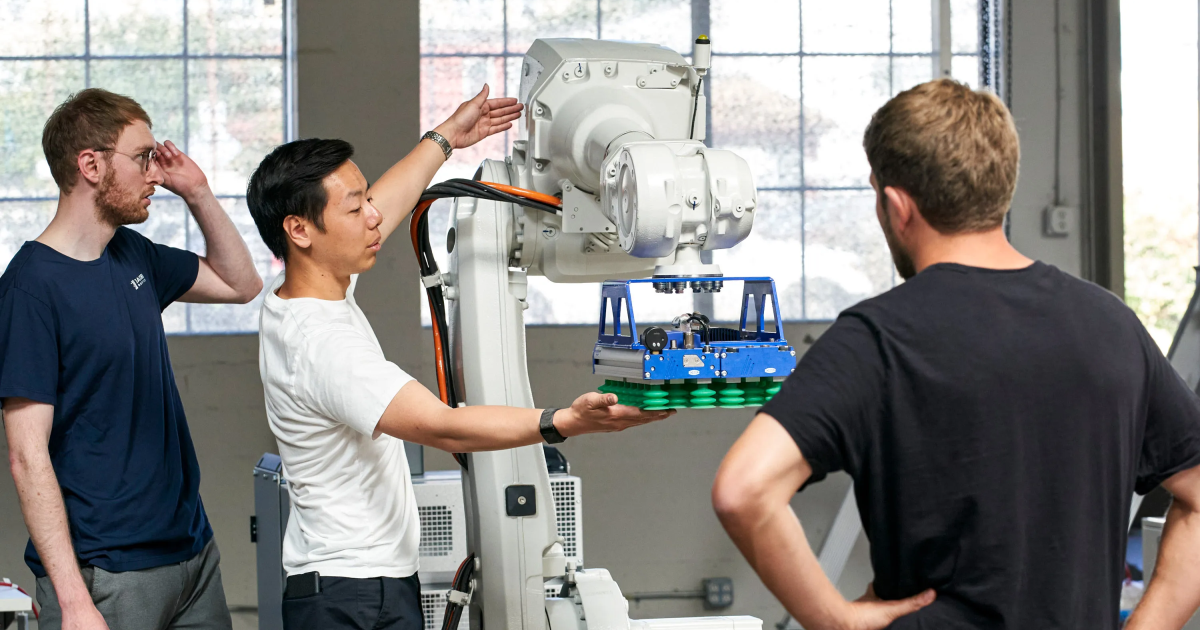
Let’s talk about Jacobi Robotics, readers.
The M.O. at Jacobi is quite straightforward – accelerate the adoption of robot automation so human workers can focus on more meaningful and creative endeavors. Through its work to make robotic arms faster (and much easier to program), Jacobi remains highly optimistic about a future where manual labor is smartly (and widely) automated so people can live healthier and more sustainable lives as they complete valuable projects. By building and providing businesses with the missing middle layer between hardware and application-specific features, Jacobi’s proprietary motion planning technology enables robotics (and the teams behind them) to make substantial progress in days, rather than weeks or months. (Motion planning, for those unaware, involves controlling a robot’s joins to maneuver its end-of-arm tool while avoiding obstacles; it’s a foundational part of the computational load required for robotic-centric practicality, especially in commercial settings.)
Here’s another angle. In its own words, Jacobi strives to:
- Leverage off-the-shelf building blocks and reduce the development time of robot arm applications by 10x, instead of starting from scratch.
- Expand the available talent pool for robot automation by 100x, instead of limiting robotics to a select group of experts; for instance, empowering “any of the approximately 1.6 million software developers in the U.S. today, rather than a slice of roughly 15,000 specialists.”
- Make robots safe around humans; that’s the key. Instead of placing robots in cages, using reactive motion planning allows these machines to adapt to dynamic environments, resulting in them being more proficient (and safer) around actual people.
The first of the aforementioned building blocks, in Jacobi’s eyes, is the linchpin of motion – on-the-go perception, grasping mechanisms, and drivers for hardware abstraction will follow. Then, AI-powered robot programming comes into play; cutting-edge technology powered by deep learning to compute time-optimized, collision-free (and singularity-free) motions in mere milliseconds. Moreover, Jacobi builds its AI-based robot algorithms with the necessary guardrails to increase productivity and reliability for standardized applications in manufacturing, construction and logistics (for example) while staying in line with necessary regulations.
To some, these concepts might sound ultra-futuristic, in nature.
To Jacobi, it’s a regular Tuesday.
That’s why – following the company’s official launch – Jacobi also successfully raised $5 million. This seed round was led by Moxxie Ventures, with additional participation from Foothill Ventures, Humba Ventures, and The House Fund. (Existing investors Swift Ventures, Berkeley SkyDeck Fund, and LDV Partners participated, as well.)
Furthermore, the company announced the availability of the Jacobi Palletizer, a software application designed “to reduce the development and deployment time for system integrators.” This, in tandem with Jacobi’s Motion Platform, eliminates the need to manually teach robot paths, enabling bolder, faster and more optimized robot trajectories for best-possible cycle times. (We’re talking setting up in minutes and being fully programmed with patterns within a day; that’s impressive.) The Jacobi Palletizer has great potential, given how “more than $400 billion worth of U.S. trade is exported annually on pallets, driving high demand for robotic palletizers that stack cases onto pallets for storage and shipment,” a Jacobi representative described.
“Just a few years ago, machine learning was limited to a small group of experts and researchers,” explained Max Cao, CEO and co-founder of Jacobi Robotics. “Today, any software developer can train a production-ready machine learning model by following an online tutorial. Similarly, in a few years, software engineers will be implementing production-ready robot applications using Jacobi. This is the future we see, as the strong market demand is already underscoring how programming for industrial robots is ripe for a massive shift.”
Hence, this new financing will allow Jacobi to ramp up its capacity rapidly so it can realistically meet demand fulfillment.
“The founders of Jacobi Robotics are leading roboticists hailing from the Berkeley AI Research Lab, acclaimed for their trailblazing research in AI, optimization, and motion planning,” said Alex Roetter, General Partner at Moxxie Ventures. “They have effectively leveraged their academic roots to rapidly build a company that addresses critical needs in the robotics space. Their comprehensive understanding of both the technical and commercial aspects of robotics has helped them design a platform that simplifies programming for industrial robots.”
Edited by
Greg Tavarez





